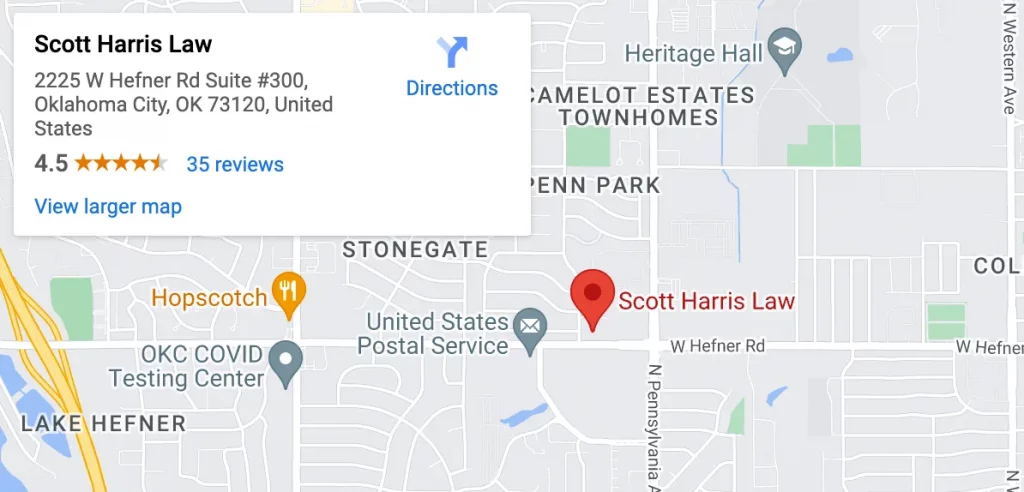Behind on Payments? What You Need to Know About Wage Garnishment in Oklahoma
In Oklahoma City, we recognize the significance of putting a stop to wage garnishment and restoring your financial peace of mind. The journey to stop garnishment in Oklahoma might seem daunting, but you don’t have to navigate it alone.
At Scott Harris Law, PLLC, we stand ready to offer you both empathetic support and legal guidance. Our legal team is experienced in assisting individuals like you who are seeking effective ways to stop garnishment and regain financial stability. Allow us to be your allies in your journey to stop garnishment in Oklahoma.
Reach out to our wage garnishment attorney now to schedule your free consultation. Let’s work together for a brighter financial future.
What is Wage Garnishment?
Wage garnishment is a legal process through which a portion of an individual’s earnings is withheld by their employer and directed towards satisfying a debt owed to a creditor. This process typically occurs as a result of a court order or other legal action taken by the creditor. Wage garnishment is often used as a means of collecting unpaid debts, such as outstanding loans, taxes, child support, alimony, or court-ordered judgments.
How Does Wage Garnishment Work?
In Oklahoma, wage garnishment follows a legal process that involves several steps. Here’s an overview of how wage garnishment works in Oklahoma:
-
Creditor Initiates Legal Action
The process begins when a creditor initiates legal action against a debtor to collect an unpaid debt. This typically involves filing a lawsuit in court and obtaining a judgment in favor of the creditor.
-
Obtaining a Judgment
Once the court rules in favor of the creditor and grants a judgment, the creditor can proceed to pursue wage garnishment as a means to collect the debt.
-
Notice to Debtor
In Oklahoma, the creditor must provide the debtor with a written notice at least 10 days before the garnishment starts. This notice informs the debtor about the upcoming wage garnishment, the amount to be garnished, and the debtor’s rights.
-
Calculation of Garnished Amount
Oklahoma law limits the amount that can be garnished from a debtor’s wages. Generally, creditors can garnish up to 25% of the debtor’s disposable income after legally required deductions (like taxes and Social Security) have been made.
-
Employer Compliance
Once the notice period has passed, the creditor provides the necessary information to the debtor’s employer. The employer is then legally obligated to withhold the specified garnishment amount from the debtor’s wages.
-
Payment to Creditor
The employer forwards the garnished funds to the creditor or the creditor’s attorney, who will apply the funds toward the outstanding debt. The garnishment continues until the debt is fully satisfied unless a court order or agreement dictates otherwise.
-
Exemptions
Certain types of income are protected from garnishment in Oklahoma, including Social Security benefits, unemployment compensation, and certain types of pensions. However, wage garnishment for child support, spousal support, and certain tax debts can still occur.
-
Debtor’s Rights
Debtors in Oklahoma have the right to object to the wage garnishment or request a hearing if they believe the garnishment amount is incorrect or if they have valid reasons for contesting the action.
-
Termination of Garnishment
Once the debt is fully paid off or otherwise resolved, the garnishment will be terminated. The debtor should receive notice when the garnishment is completed.
If you’re facing wage garnishment in Oklahoma, consulting with our wage garnishment attorney is advisable to understand your rights and options.
What are the Wage Garnishment Protections for Employees?
Numerous protections are in place to shield employees facing wage garnishment. Both at the federal level and across various states, regulations are established to prevent debtors from facing destitution while repaying their debts. Among the pivotal protections, two stand out:
- Capped Garnishment Amount: A ceiling exists on the proportion of an individual’s earnings that can be garnished. According to the Consumer Credit Protection Act (CCPA), garnishments pursued through federal court are constrained to a maximum of 25% of the debtor’s disposable income per week.
- Job Security for Garnished Employees: The law provides a shield against termination solely due to wage garnishment for a single debt. This federal statute safeguards employees from losing their jobs as a direct result of having their wages garnished for a single debt.
These provisions are put in place to alleviate the potential hardships faced by employees undergoing wage garnishment, ensuring financial stability and protecting employment status.
What are the Restrictions on Wage Garnishment?
The extent to which an employee’s wages can be garnished is determined by their “disposable earnings,” representing the remainder after obligatory deductions have been accounted for. These deductions encompass federal, state, and local taxes, the employee’s contributions to State Unemployment Insurance and Social Security, as well as mandatory withholdings for employee retirement plans as stipulated by law.
Deductions not mandated by law, such as those for voluntary wage assignments, health and life insurance, union dues, contributions to charitable causes, purchases of savings bonds, retirement plan contributions (excluding those legally required), and payments for payroll advances or merchandise purchases from employers, are typically not factored in when calculating disposable earnings under the CCPA.
How to Avoid a Wage Garnishment Order?
To proactively avoid a wage garnishment order, it’s advisable to take certain steps before the situation escalates. However, if circumstances make it challenging to prevent, there are still actions you can take:
- Early Debt Management: The most effective strategy is to start addressing your debt before it reaches the point of wage garnishment. Prioritize catching up on overdue payments and consider contacting your creditors to discuss payment plans or alternatives.
- Contact Creditors: If you anticipate difficulties in meeting your financial obligations, communicate with your creditors promptly. Many entities, such as student loan administrators, offer options to avoid default by renegotiating terms.
- Modify Child Support: If you’re struggling to meet child support payments, explore the possibility of obtaining a court-ordered modification based on your changed financial circumstances.
- Structured Tax Payments: The IRS and some state tax agencies may provide options to set up structured payment plans for overdue taxes, helping you avoid extreme measures like wage garnishment.
- Negotiate with Private Debts: Engage in negotiations with private creditors, such as banks, to establish more manageable payment arrangements that accommodate your financial situation.
- Attend Garnishment Hearings: If you receive notice of a wage garnishment hearing, don’t disregard it. Attend the hearing if possible, ideally with legal representation. Bring documentation of your debt-related efforts, income, expenses, and any negotiation attempts.
- Bankruptcy Option: Filing for bankruptcy initiates an automatic stay on debt collection, except for certain obligations like child support. This pause provides you with the opportunity to address your financial situation under legal protection.
- Post-Garnishment Action: If garnishment begins and you missed the hearing, request a copy of the court order from your employer. You may have the option to petition the court to review or modify the garnishment order based on your circumstances.
While avoiding wage garnishment through proactive measures is ideal, it’s important to know that you still have options even if the garnishment is imminent or has already started. Consulting with our wage garnishment attorney in Oklahoma and maintaining open communication with creditors can help you navigate these challenges and seek the best possible outcomes for your financial situation.
Call our Oklahoma Wage Garnishment Attorney Now!
In the midst of financial challenges and the threat of experiencing wage garnishment, it’s crucial to remember that there are options available to regain control over your financial well-being. By understanding the complexities of garnishment laws and seeking legal guidance from our wage garnishment attorney, you can explore a range of options to safeguard your income and assets.
At Scott Harris Law, PLLC, we also provide comprehensive legal support in other areas that are tailored to your unique circumstances. Our law firm is dedicated to walking you through the debt negotiation process, evaluating your debt consolidation options, addressing credit card debts, and other avenues to protect your interest and ensure your financial recovery.
Don’t let the burden of wage garnishment overwhelm you. Take that crucial step towards a brighter financial future by reaching out to Scott Harris Law, PLLC for a free consultation today!




